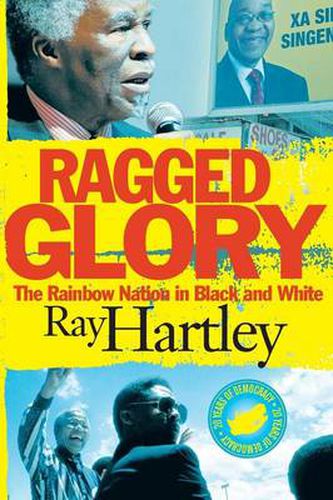Readings Newsletter
Become a Readings Member to make your shopping experience even easier.
Sign in or sign up for free!
You’re not far away from qualifying for FREE standard shipping within Australia
You’ve qualified for FREE standard shipping within Australia
The cart is loading…






This title is printed to order. This book may have been self-published. If so, we cannot guarantee the quality of the content. In the main most books will have gone through the editing process however some may not. We therefore suggest that you be aware of this before ordering this book. If in doubt check either the author or publisher’s details as we are unable to accept any returns unless they are faulty. Please contact us if you have any questions.
On a cold Highveld morning in May 1994, Nelson Mandela took the oath of office to become South Africas first democratically elected president. A new era had begun. The promise of those heady days of political transition soon gave way to a more sober view on the magnitude of the challenges facing the new government. Under Mandela and his successor, Thabo Mbeki, the country grappled with the restructuring of the state, massive inequality and poverty, rising crime, battles over economic policy, the arms deal, the HIV/AIDS crisis, the BEE era, the cancer of political corruption and the rise of a new and predatory political elite. With the removal of Mbeki, followed by the interregnum of Kgalema Motlanthe, the stage was set for the coming to power of the controversial Jacob Zuma. These are all key threads in Ray Hartleys rich and complex narrative history of the democratic era. As a leading political journalist and newspaper editor, Hartley had the best seat in the house for the unfolding drama of the new South Africa, as well as privileged access to many key players, including Nelson Mandela himself. Admirably concise but rich in detail, drawing on a wide spectrum of interviews, documents and experiences, this book offers a bracingly critical look back at the achievements and the failures of two turbulent decades, during which South Africa took its place at the table of free nations but lost something of its moral authority.
$9.00 standard shipping within Australia
FREE standard shipping within Australia for orders over $100.00
Express & International shipping calculated at checkout
This title is printed to order. This book may have been self-published. If so, we cannot guarantee the quality of the content. In the main most books will have gone through the editing process however some may not. We therefore suggest that you be aware of this before ordering this book. If in doubt check either the author or publisher’s details as we are unable to accept any returns unless they are faulty. Please contact us if you have any questions.
On a cold Highveld morning in May 1994, Nelson Mandela took the oath of office to become South Africas first democratically elected president. A new era had begun. The promise of those heady days of political transition soon gave way to a more sober view on the magnitude of the challenges facing the new government. Under Mandela and his successor, Thabo Mbeki, the country grappled with the restructuring of the state, massive inequality and poverty, rising crime, battles over economic policy, the arms deal, the HIV/AIDS crisis, the BEE era, the cancer of political corruption and the rise of a new and predatory political elite. With the removal of Mbeki, followed by the interregnum of Kgalema Motlanthe, the stage was set for the coming to power of the controversial Jacob Zuma. These are all key threads in Ray Hartleys rich and complex narrative history of the democratic era. As a leading political journalist and newspaper editor, Hartley had the best seat in the house for the unfolding drama of the new South Africa, as well as privileged access to many key players, including Nelson Mandela himself. Admirably concise but rich in detail, drawing on a wide spectrum of interviews, documents and experiences, this book offers a bracingly critical look back at the achievements and the failures of two turbulent decades, during which South Africa took its place at the table of free nations but lost something of its moral authority.